
Many types of wrestling matches, sometimes called "concept" or "gimmick matches" in the jargon of the business, are performed in professional wrestling. Some gimmick matches are more common than others and are often used to advance or conclude a storyline. Throughout professional wrestling's decades-long history, some gimmick matches have spawned many variations of the core concept.

Bret Sergeant Hart is a Canadian-American retired professional wrestler. A member of the Hart wrestling family and a second-generation wrestler, he has an amateur wrestling background at Ernest Manning High School and Mount Royal College. A major international draw within professional wrestling, he is credited with changing the perception of mainstream North American professional wrestling in the early 1990s by bringing technical wrestling to the fore. He is widely regarded as one of the greatest professional wrestlers of all time; Sky Sports noted that his legacy is that of "one of, if not the greatest, to have ever graced the squared circle". For the majority of his career, he used the nickname "The Hitman".

Randy Mario Poffo, better known by his ring name "Macho Man" Randy Savage, was an American professional wrestler, actor, rapper and professional baseball player. He is best known for his time in the World Wrestling Federation and World Championship Wrestling (WCW).
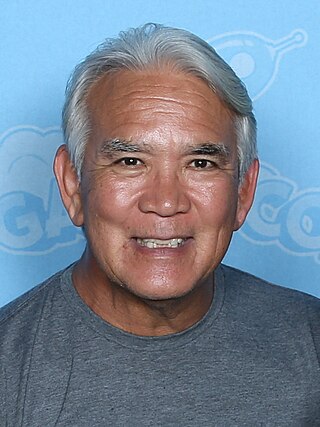
Richard Henry Blood Sr., better known by his ring name Ricky "the Dragon" Steamboat, is an American retired professional wrestler best known for his work with the American Wrestling Association (AWA), Jim Crockett Promotions (JCP), World Championship Wrestling (WCW), and the World Wrestling Federation. Steamboat is regarded as one of the greatest and most influential professional wrestlers of all time.

Leon Allen White, better known by his ring names Big Van Vader or simply Vader, was an American professional wrestler and professional football player. Throughout his career, he performed for New Japan Pro-Wrestling (NJPW), World Championship Wrestling (WCW), the World Wrestling Federation (WWF), All Japan Pro Wrestling (AJPW), and Pro Wrestling Noah (NOAH) during the 1990s and 2000s. He is widely regarded as one of the greatest super-heavyweight professional wrestlers of all time.

Battle royal traditionally refers to a fight involving many combatants, usually conducted under either boxing or wrestling rules, where the winner is the one who registers the most wins. In recent times, the term has been used in a more general sense to refer to any fight involving large numbers of people who are not organized into factions. Within combat sports and professional wrestling, the term has a more specific meaning.
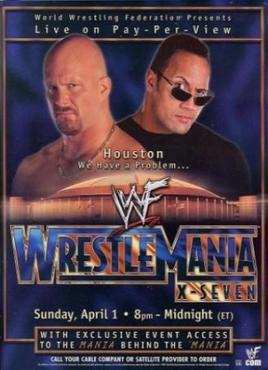
WrestleMania X-Seven was the 17th annual WrestleMania professional wrestling pay-per-view (PPV) event produced by the World Wrestling Federation (WWF). It took place on April 1, 2001, at the Reliant Astrodome in Houston, Texas. It was the first WrestleMania held in the state of Texas. Twelve matches were contested at the event, including one broadcast exclusively on the Sunday Night Heat pre-show.
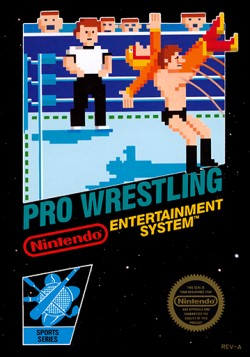
Pro Wrestling is a pro wrestling video game developed and published by Nintendo. It was released originally for the Famicom Disk System in Japan in 1986. It was later released in North America and Europe on the Nintendo Entertainment System. The game was the third wrestling game on the Nintendo Entertainment System.
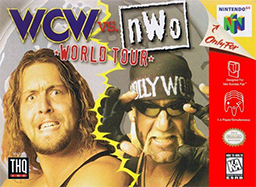
WCW vs. nWo: World Tour is a professional wrestling video game released in 1997 for the Nintendo 64 game console. Released at the peak of World Championship Wrestling's (WCW) dominance in the Monday Night War, World Tour was THQ's first foray into the N64 wrestling scene and is a semi-sequel to the lesser known WCW vs. the World for the PlayStation. It is the second best-selling wrestling game for the N64 console.

WWF WrestleMania 2000 is a professional wrestling video game released in 1999 on the Nintendo 64 (N64) console. It was based on the World Wrestling Federation's annual pay-per-view, WrestleMania. Despite the fact that this game is based upon WrestleMania 2000, the game was released five months prior to the actual PPV itself, therefore resulting in the game using the stage design from the 1999 event, WrestleMania XV, instead. Released at the height of the WWF's Attitude Era, WrestleMania 2000 was the first WWF game released by THQ. The wrestling company ended its long relationship with Acclaim Entertainment after witnessing the video game success of its competitor, World Championship Wrestling (WCW), on behalf of THQ. WrestleMania 2000 shares its game engine with the Japan-only release Virtual Pro Wrestling 2: Ōdō Keishō.
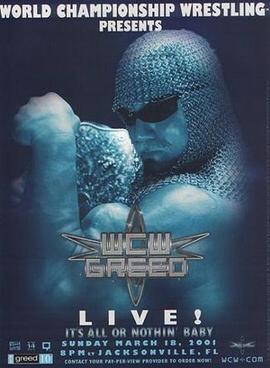
Greed was the final professional wrestling pay-per-view (PPV) event produced by World Championship Wrestling (WCW). It took place on March 18, 2001 from the Jacksonville Memorial Coliseum in Jacksonville, Florida. Greed replaced the promotion's March PPV event Uncensored which was held from 1995 to 2000. The pay-per-view event took place three days before the final episode of Thunder and eight days before the final episode of Monday Nitro.

Capital Combat: Return of RoboCop was a one-time professional wrestling pay-per-view (PPV) event from the National Wrestling Alliance (NWA) held under the World Championship Wrestling (WCW) name. Capital Combat took place on Saturday, May 19, 1990, at the D.C. Armory in Washington, D.C. The show featured a promotional crossover with the imminent release of RoboCop 2, with RoboCop rescuing Sting from an attack by the Four Horsemen during the PPV.

Saturday Night Slam Masters, known in Japan as Muscle Bomber: The Body Explosion, is a 1993 pro wrestling arcade game released for the CP System by Capcom. The game features character designs by manga artist Tetsuo Hara, famous for Fist of the North Star.
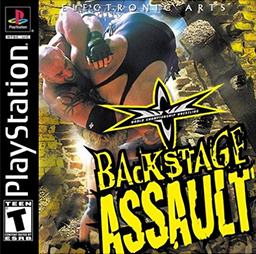
WCW Backstage Assault is a professional wrestling video game developed by Kodiak Interactive and published by Electronic Arts. It was released for the PlayStation in November 2000, and for the Nintendo 64 in December. It was the final World Championship Wrestling (WCW) game released before the World Wrestling Federation (WWF) purchased the company's assets three months later. Backstage Assault features commentary by Tony Schiavone and Bobby "The Brain" Heenan. Gameplay takes place outside of a wrestling ring, an approach that was poorly received and resulted in the title selling 200,000 copies.
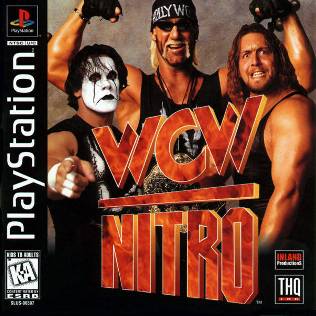
WCW Nitro is a professional wrestling video game based on the television show WCW Monday Nitro. Released by THQ for the PlayStation game console in 1998, the game featured a large roster of playable WCW wrestlers as well as full motion video clips of the television show. The game was followed by WCW/nWo Thunder, which was based on Nitro's Thursday night counterpart. Ports for Nintendo 64 and Microsoft Windows were released later in 1998 and 1999 with the updated roster featured in Thunder.

WWF War Zone is a professional wrestling video game developed by Iguana West and released by Acclaim Entertainment in 1998 for the PlayStation, Nintendo 64, and Game Boy. The game features wrestlers from the World Wrestling Federation (WWF).
WarGames is a specialized steel cage match in professional wrestling. The match usually involves two teams of either four, five, or more wrestlers locked inside a steel cage that encompasses two rings placed side by side. The cage may or may not have a roof, depending on which professional wrestling promotion the match is held in.
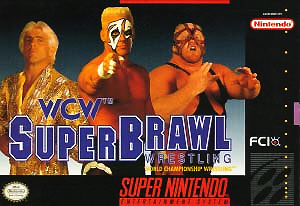
WCW SuperBrawl Wrestling is a professional wrestling video game published by FCI, Inc. for the Super Nintendo Entertainment System in 1994. The third World Championship Wrestling (WCW) video game, it is named after the pay-per-view SuperBrawl. It was the only WCW game to be released on the Super NES, and the last to be produced by FCI, Inc. A Sega Genesis version was planned but never released.
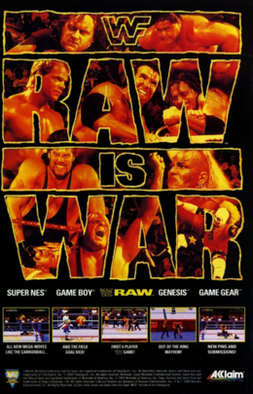
WWF Raw is a professional wrestling video game based on the television show of the same name produced by the World Wrestling Federation (WWF), released for the SNES, 32X, Mega Drive/Genesis, and Game Boy in late 1994 and early 1995 by Acclaim Entertainment. It is the sequel to the WWF Royal Rumble game that was released in 1993, and is the final part of LJN's 16-bit WWF trilogy. Players can play either One-on-One, Tag Team, Bedlam, Survivor Series, Royal Rumble, or a Raw Endurance Match. Unlike its predecessor, WWF RAW is multitap compatible.


















